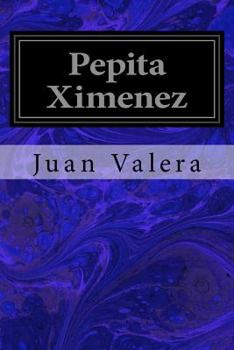Pepita Ximenez
Select Format
Select Condition 
Book Overview
JUAN VALERA Y ALCAL?-GALIANO, naci? en Cabra, provincia de C?rdoba, el 18 de octubre de 1824. Descend?a de estirpe aristocr?tica y su madre era marquesa de la Paniega. Su padre, un liberal de... This description may be from another edition of this product.
Format:Paperback
Language:English
ISBN:1975942914
ISBN13:9781975942915
Release Date:August 2017
Publisher:Createspace Independent Publishing Platform
Length:118 Pages
Weight:0.37 lbs.
Dimensions:0.3" x 6.0" x 9.0"
Customer Reviews
4 ratings
Good order
Published by Thriftbooks.com User , 15 years ago
Arrived a little later than I expected, but besides that, it was a good order.
Part of a great series for Spanish learners
Published by Thriftbooks.com User , 15 years ago
If you are learning Spanish, the series Coleccion leer en espanol is a great help. I started with level three after having two semesters of college-level Spanish. I've found it useful to go back a re-read some of them to test my retention of the new vocab. I really enjoy the series and the books don't feel like they were written for kids. Pepita Jimenez is perfect to transition from basic to intermediate Spanish. The vocabulary is repeated throughout the novel, so by the end you're pretty much reading it without the aid of a dictionary. I would say I got about 40 new, really useful vocabulary words from it. It uses the main tenses as well as present subjunctive, so it was helpful for me to run across these grammar points 'in action'. It is an adaptation for learners, so don't expect to be swept away by a grand classic of Spanish literature. The plot does move, though, so you feel like you are getting at least a glimpse of what it was that made the novel so successful when it first appeared.
A forgotten masterpiece.
Published by Thriftbooks.com User , 23 years ago
'Pepita Jimenez', once considered the great 19th century Spanish novel, now lies neglected by most readers and critics. Neither Penguins, Everyman nor Oxford, the pre-eminent publishers of 'Classics', have ever produced an edition, and I only became aware of its existence by accident on the net. Having just read - and loved - the novel, I can see some reasons for its decline in popularity. for a start, unlike most 19th century novels, it is not realistic or naturalistic; it does not portray a society with voluminous detail. The hero, Don Luis de Vargas, the son of an Andalusian squire and an aspirant to the priesthood, is prone to use the high-flown, ecstatic and orotund language of the spirit, which, though set up by Valera to be undermined, can irritate the reader with its verbosity. The translation, by Valera himself, needs to be updated for the tastes of a modern readership - the famed beauty of the original can appear washily sentimental in unforgiving English. Most importantly, the novel's sunny benevolence, its attempt to reconcile the totems of Spanish conservatism - the Church, the Aristocracy, the Family - with less tractable forces such as Love and Nature, is not fashionable with critics who historicise Spain as a country with violent divisions, and who want their fiction to conform to this vision.for those willing to take the chance, however, 'Pepita' has something for everyone. Its story of a theologian and his attempts to repress a growing love for the title character, a young widow and the intended of his rakish father, has all the abundant romanticism, terrible tension and potential tragedy of 'Wuthering Heights'. From the novel's first page, when Don Luis describes to his uncle and mentor the Archbishop his first meeting with Pepita, we know what will happen - the interest lies in the unfolding of the inevitable and the psychology of the characters, especially Luis, whose sacred and profane raptures spring from the same source (in its relentless focus on an unstable and delusive psychology, 'Pepita' is closer to the works of Prevost, Constant and Stendhal, than later 19th century realists).Though not a realistic novel, the book is full of indelible set-pieces of Andalusian village life (trade, social occasions, rites, customs, night-life, festivals, in which the Christian and the pagan are indistinguishable, just as they are in Luis' imagination); and the overwhelming natural beauty, the latter made to serve and reflect the claustrophobic visions and passions of the characters (in its limited focus, in its conflation of spiritual and romantic ideas and language, its slippery allegorical possibilities and its proto-Expressionism, 'Pepita' could be considered the Spanish Nathaniel Hawthorne).For post-modernists, the novel's straightforward, simple narrative is contained in an elaborate framework, more familiar from Gothic fiction. Parts 1 and 3 consist of letters to the archbishop from his nephew and ward Luis, and his bro
Suspenso, amor, psicologia
Published by Thriftbooks.com User , 24 years ago
Don Luis, un joven que tiene aspiraciones de ser sacerdote, regresa a la casa de su padre después de pasar doce años con su tío en el seminario. Durante su ausencia, su padre se ha hecho pretendiente de Pepita, una viuda joven y hermosa, y a Don Luis le llega todo tipo de chismes sobre la mujer antes de que la conozca, enterándolo de toda su historia. Cuando por fin la conoce, empieza un trastorno moral dentro del pecho del pobre joven y se siente turbado, arrancado entre la lealtad hacia su padre, su vocación al sacerdocio y el deseo fuerte que le provoca Pepita. La novela se trata del psicoanálisis que resulta de este dilema y hace que el lector se cuestione a sí mismo: ¿Qué haría yo?Como toda obra de Valera, Pepita Jiménez está lleno de lenguaje hermoso que refleja su alto ideal estético. Vale la pena leerse, aún para el estudiante (aunque avanzado) del castellano.






